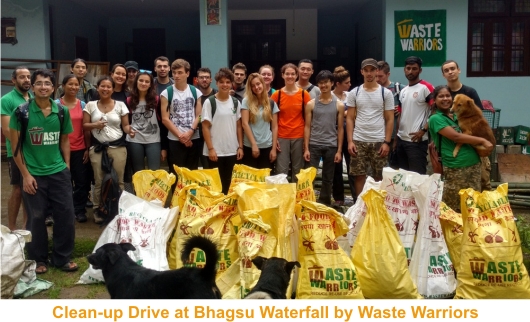|
Waste Warriors – Champions of Change
Thomas Fuller said: “We never know the
worth of water till the well is dry.” Human intervention in the natural environment has a more deterring effect than a progressive one. One such activity is tourism which significantly impacts the natural resources and the environment. Tourism in India is a thriving industry, owing to the fact that the country’s geography offers several tourist destinations with abundant source of flora and fauna. However, with the benefits of tourism, come the environment deterring human activities – waste and pollution, among others. Solid waste management has become a major issue at tourist sites. Plastic and other waste left over by the tourists are not only degrading the environment, but are also proving to be harmful to the wildlife. The Indian Himalayan Region is one of the worst sufferers of poor scientific waste management. According to the QI and AR of SPCBs/PCCs, total 5,587 tonnes of waste is produced per day in this region, out of which 4,249 tonnes of waste is collected and only 760.3 tonnes is treated.
One of the biggest challenges of this organisation is explaining concepts that don’t exist in the local language, like ‘recycling’ or 'waste segregation'. Its first task is to make these concepts meaningful for people, as well as to understand the concerns and interests of the local population in order to develop solutions that match their needs. Another challenge faced is that the government departments lack the capacity to manage the waste at such a high scale and frequency. The third challenge is convincing new businesses of the importance of practices such as composting food waste and disposing off trash responsibly. It is said that if we do not take ownership of our actions, the actions eventually own us, and we lose control over the consequences. Same is the case with the grave problem of solid waste management which is shadowing us and has a lasting depleting effect on the environment. Segregation, collection and treatment – all stages of managing waste are equally important, and the method opted for each needs to be followed with clear cut guidelines – whether it is followed by a family, an industry or the government. While there are efforts from organisations like Waste Warriors, the private sector and other civil society organisations should pitch in along with the government bodies to ensure the successful completion of the end-to-end process of solid waste management. At the same time, the informal sector also needs to be trained and given its due respect, as it plays a key role in collection and segregation. Strong public awareness campaigns can help in improving our habits towards generating less waste, segregating it and getting it collected for recycling and proper treatment. It is time each one of us takes charge of the waste we produce in our homes and work places! ■
Pravara Krunal Amreliya |
 While
there are those who make the environment suffer at the cost of
entertainment and adventure in the Himalayan terrain, there are those samaritans who take up the role of champions of change and strive to
clean up the region, thus contributing to environmental and nature
conservation. One such voluntary organisation is Waste Warriors based in
Dehradun, which is committed to tackling India’s garbage problem. It
works in three different locations and landscapes across North India - Dehradun, Dharamshala and Corbett. Some of
its key activities include -
community clean-up drives, waste collection, composting, transforming
commercial and residential localities, IEC activities on solid waste
management and empowering waste workers. The organisation’s working
method involves waste collection, transportation, segregation,
recycling, composting and disposal of non-recyclable waste. It ensures
that all the waste that is collected is segregated and disposed of
responsibly with an emphasis on recycling. Recyclable and non-recyclable
waste is collected in separate bags. The recyclables are further
categorised and sold to kabaddiwalas, whereas the non-recyclable
waste is sent to the trenching grounds. Food and garden waste is composted and turned into fertiliser.
While
there are those who make the environment suffer at the cost of
entertainment and adventure in the Himalayan terrain, there are those samaritans who take up the role of champions of change and strive to
clean up the region, thus contributing to environmental and nature
conservation. One such voluntary organisation is Waste Warriors based in
Dehradun, which is committed to tackling India’s garbage problem. It
works in three different locations and landscapes across North India - Dehradun, Dharamshala and Corbett. Some of
its key activities include -
community clean-up drives, waste collection, composting, transforming
commercial and residential localities, IEC activities on solid waste
management and empowering waste workers. The organisation’s working
method involves waste collection, transportation, segregation,
recycling, composting and disposal of non-recyclable waste. It ensures
that all the waste that is collected is segregated and disposed of
responsibly with an emphasis on recycling. Recyclable and non-recyclable
waste is collected in separate bags. The recyclables are further
categorised and sold to kabaddiwalas, whereas the non-recyclable
waste is sent to the trenching grounds. Food and garden waste is composted and turned into fertiliser.